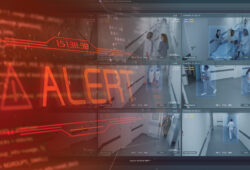The remarkable efforts by HealthTrust members to vaccinate the masses amid a global health crisis
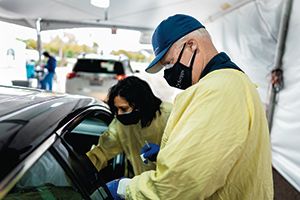
Years from now, the healthcare world will look back at the COVID-19 pandemic as a historically grueling test of resources and stamina. While healthcare providers battled the surges of infections, they were also faced with one of the most logistically challenging vaccination rollouts in our nation’s history—all within the space of a year. It’s worth noting the exemplary efforts of two of our member organizations and how they have faced this challenge with innovations and solutions.
Scripps Health
On Dec. 14, 2020, Scripps Health in San Diego received its first shipment of the Pfizer vaccine, just three days after it received emergency use authorization (EUA) from the Food and Drug Administration (FDA). Scripps began administering vaccinations quickly. The goals of its pro-
gram were to ensure fair distribution, uphold a transparent patient selection process, maintain a safe environment, and sustain a plan for transporting vaccines and supplies safety and securely.

“Serving the community is a longstanding tradition for Scripps. It is part of our mission and vision,” says Angela Rosenblatt, MS, PharmD, Corporate Director of Pharmacy Ambulatory Services and Scripps MD Anderson Pharmacy Services at Scripps Health. “We have both underserved and more affluent populations. We need to reach all those areas with patient care in a way that is understandable, equitable and accessible for them.”
Using Microsoft Teams, the organization developed workgroups and a centralized online repository for sharing documents and educational resources. It also formed a vaccine advisory committee to scientifically evaluate each vaccine, provide guidance, and educate the organization, its patients, and staff to reduce any hesitancy or fears people had about getting a vaccine that had been developed and approved for use so quickly.
Automated scheduling
Hospital staff was first on the tiered vaccine rollout list. They started with acute care staff and subsequently targeted those in ambulatory departments, administrative staff and, finally, volunteers. They were careful to stagger vaccination appointments for the acute care workforce since they were already dealing with the impact of COVID sick calls.
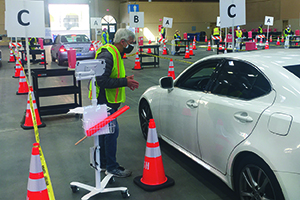
To schedule and manage patient vaccine appointments, Scripps leveraged its electronic health record system and created a user-friendly process for self-scheduling and eligibility screening. When appointment slots became available, eligible patients would automatically receive a notification letting them know they could make an appointment through the online patient portal. Patients also automatically received a prompt to schedule their second dose at a clinic offering the same vaccine brand they started with.
Medication orders in the EHR were configured so they would function identically irrespective of vaccine brand, which allowed the pharmacy team to send single bulk batches of orders to a large patient population. At the time of the clinic encounter, they would associate the vaccine type with the patient. Because the specific vaccines offered at various clinics changed based on availability, this made the medication order process highly efficient and eliminated the need to manually revise and resend orders.
Accessible sites
“It was an enormous effort. The IT team did a significant amount of heavy lifting. We had our nurse executives running the clinics. There were so many intricacies. And, a huge number of volunteers,” says Rosenblatt.
From the northernmost part of San Diego County to just a few miles from the Mexico border, Scripps set up 15 vaccine clinics for community members who span a wide-ranging socioeconomic demographic. Clinic sites were selected to ensure equitable vaccine access and minimize health disparities to meet the top priority of serving a diverse population.
Each vaccine type is a little different in terms of how it is administered and handled. As a result, the team at Scripps became experts on each of the three COVID vaccines very quickly. Superusers were assigned to clinic sites to provide training and support to clinic staff, and to ensure all protocols were properly followed.
In mid-February, they worked with the county to open a drive-through mass vaccination site at the Del Mar Fairgrounds, where they could administer up to 10,000 vaccines a day. Patients pulled up to the center and stayed in their cars as they were screened and received the vaccine, and then pulled over to an observation area.
Stellar patient experience
The appointment system within the EHR allowed most of the work to be completed ahead of time, so community members breezed through the smaller clinics with almost no wait times.
“We received nothing but positive feedback from the community, and the whole experience was amazing,” says Rosenblatt. “The first person I gave a shot to started crying and said that this was the first time they had been out of their house in 12 months. To experience that glimmer of hope was very special.”
Scripps was able to meet its goal of having people in and out in under 30 minutes, including observation time, which is credited to a meticulously mapped-out traffic flow, advance dose preparation and the ability to staff up or down in real time.
“When we finally closed the clinic, we had an appreciation event, and people said it was the most fun they’d had in a long time,” says Rosenblatt. One woman who lost her job during COVID said that volunteering at the clinic gave her purpose during the pandemic.
Altogether, Scripps had administered over 150,000 vaccines to the community by August 2021, including more than 75% of its employees.
University Medical Center of Southern Nevada (UMC)
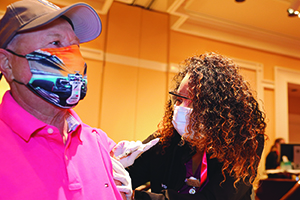
UMC had already earned its reputation as a community leader three years prior to the pandemic when it responded to the deadliest mass shooting in modern American history at the Route 91 Harvest Festival in Las Vegas. With COVID-19, UMC has once again led its community through crisis, including providing tens of thousands of vaccines through a unique corporate partnership and, ultimately, a permanent COVID-19 clinic.
Knowledge-sharing with community hospitals
In early 2020, before Nevada saw its first case of COVID, UMC initiated a forum to bring together executive and clinical leadership from local hospitals and other healthcare organizations. The team at UMC shared response plans to help other hospitals prepare for the impact of COVID-19, since it was the only hospital in Southern Nevada with a dedicated, full-time team of employed infectious disease physicians.
On-site COVID testing
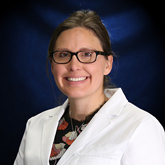
UMC built a second on-site lab within the medical center for COVID-19 testing. The team converted a space in the hospital that was formerly occupied by an outpatient physical therapy gym. “The lab significantly expanded Nevada’s overall testing capacity at a critical time,” says Jamie King, Director of Pharmacy. “Our team built this lab from the ground up in a matter of weeks, recognizing the urgent need for testing resources early in the pandemic.”
With a capacity of 10,000 tests per day, the lab had processed more than 1.1 million COVID tests by mid 2021. This includes testing all admitted patients to promote a safe clinical environment.
Mass vaccination site with positive economic impact
By summer of 2021, UMC had provided more than 66,000 vaccine doses to community members. It is the only hospital in Southern Nevada offering public vaccinations. Following the tier system, it began with vaccinating its front-line healthcare workers. As the vaccine program criteria opened up and more people were eligible to receive the shot, UMC realized it couldn’t keep up and decided to open a mass vaccination center.
In 2020, the Nevada economy suffered greatly due to its high dependence on tourism. The impact of hotel and convention closures, coupled with fear of travel during the pandemic, significantly decreased the number of vacationers. A partnership with Wynn Resorts provided staff and security to help screen patients for appointments, direct traffic and assist patients as they entered the property.
The prime location allowed UMC to operate a mass vaccination clinic right on the Las Vegas Strip, with the ability to reach the region’s many hospitality workers. Vaccinating the community, especially hospitality workers, was one of the first steps in reopening the city to tourism and will be instrumental in reestablishing the region as a thriving, vibrant and healthy destination for travelers.
UMC shifted operations to a dedicated COVID-19 vaccination site and clinic in May 2021. This site, known as the UMC Advanced Center for Health, will continue to play a critical role in safeguarding the health of community members.
“As Nevada’s most sophisticated hospital, UMC has a unique responsibility to meet the urgent healthcare needs of community members and offer leadership during times of crisis,” says King. “This community-focused philosophy continues to play a vital role in UMC’s response to the COVID-19 pandemic, supporting our efforts to safeguard the health of Nevadans during their greatest time of need.”
Read more stories about member community outreach efforts.
Share Email COVID-19, Disaster & Emergency Preparedness, Q4 2021, Vaccines
